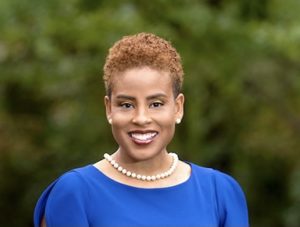“For some, this is going to be a slow yes. I’m not giving up hope on people.”
A Conversation with Dr. Amber Brooks
Amber Brooks, MD, is associate professor of anesthesiology at Wake Forest School of Medicine. She’s also a researcher, a mentor and a justice seeker. FaithHealth’s Gary Gunderson and Teresa Cutts caught up with Brooks after running into her at a vaccination event at United Metropolitan Missionary Baptist Church in Winston-Salem.
First, what was the journey that brought you to where you are today?
Brooks: My journey to becoming a physician is truly a God-given calling. Except for a cousin who was a dentist, no one in my extended family was in the medical field. Around the age of 12, I came home one day and told my parents that I wanted to be a physician. And they said that takes a lot of hard work, but they encouraged and supported me to pursue this calling. I grew up in  a strong faith-based home. My dad, who was involved in politics and law for a good chunk of his life, decided to pursue his calling of becoming a pastor and in his 50s, went to seminary and ended up joining the Methodist denomination. He played a strong role in the development of my faith. I lived in the church, we went to church, my dad was a deacon in the church when I was younger, so church was like our second home.
a strong faith-based home. My dad, who was involved in politics and law for a good chunk of his life, decided to pursue his calling of becoming a pastor and in his 50s, went to seminary and ended up joining the Methodist denomination. He played a strong role in the development of my faith. I lived in the church, we went to church, my dad was a deacon in the church when I was younger, so church was like our second home.
As much as I love anesthesiology, in the middle of my training I realized that pain medicine, a subspecialty of anesthesia, allowed me to have continuity of care and connection with patients. It lets me serve with all the tools my faith has supplied me, to be able to deliver care to what can be a difficult, challenging, vulnerable patient population. So, I think about being compassionate, about giving people grace, about meeting patients where they are. All of the core tenants of our faith are easily applied to this specific patient population who, at times, come to me in desperate, dire need of managing their pain. Often, pain is intricately connected to psychosocial issues like substance abuse or psychiatric illness. Your faith has ample opportunities to shine through when you’re taking care of people who are in chronic pain.
The other day we saw you doing a vaccine clinic at your church in Winston-Salem where hundreds were getting vaccinated. Can you talk about that?
Brooks: The other part of my mission work is trying to address disparities and to care for vulnerable populations, whether that be racial and ethnic minorities or older adults. As you know, when vaccines first started to become available there was a fair amount of hesitancy amongst everyone but particularly amongst communities of color. Those concerns are multifaceted and relate to trust within the health community, especially here in our community. I wanted to make sure I was leading by example and making myself available for communities of color within as well as outside the walls of a hospital. I’m spreading facts, doing a lot of listening and making sure I fully address people’s concerns. So that’s how you saw me in the basement of my church, assisting with that vaccine clinic. The day before, I was at Winston-Salem State, because they have a program with FEMA (the Federal Emergency Management Agency) as well as Wake Forest Baptist to make the vaccine accessible to communities of color.
So, there are two parts. There’s the hesitancy part that, given the massive educational campaign around the vaccine, I feel has decreased amongst all populations. The other key part is making sure that communities of color and older adults are able to get the vaccine.
At both the church and at Winston-Salem State, we were thrilled to see the number of our clinicians and providers. The spirit in those rooms was extraordinary; it seemed generous with a lot of gratitude, especially among the providers for having the opportunity to be where they otherwise would not have been.
 Brooks: If we can step into communities we otherwise would not step foot into for COVID-19, what else could we do to bring services? I think the presence of Wake Forest Baptist in the community helps address long-standing trust issues that date back to times of segregation and discrimination.
Brooks: If we can step into communities we otherwise would not step foot into for COVID-19, what else could we do to bring services? I think the presence of Wake Forest Baptist in the community helps address long-standing trust issues that date back to times of segregation and discrimination.
Now you’re helping guide the institution to find its way in the community. What can we hope for?
Brooks: As more people get vaccinated, we have an opportunity to be more present. A restaurant owner in Winston-Salem reminded me that this does not have to be complex. It could simply be having a safe space where people can come to get blood pressure taken, where you offer coffee and an opportunity for people drop in and to gather around health-related issues.
How do you talk with those who are firm in their desire to not get a vaccine?
Brooks: Having Johnson & Johnson halt their vaccine for safety concerns and then to relaunch just recently did not help our cause with regards to the hesitancy, because people who were already on the edge were like, “Ah, See? This is why I did not get the vaccine.” If you look at the numbers, six to seven cases of the thrombotic or clot events out of more than a million is really, really, small. You can have more clotting disorders and risk with birth control pills and smoking.
Continuing to share information is so important, and young people especially are all over social media. I have a hate-love relationship with social media, but I try to leverage it for good, to disseminate information. And because I’m an individual in communities of color, I find that if I post an article, people send me private messages, asking me to explain this or that. I can’t tell you how many times over the last few months when I posted information about the vaccine that somebody privately reached out to me.
 I have also learned that for some, this is going to be a slow yes. I’m not giving up hope on people yet. You have to keep hitting them with information, with examples of people who have had the vaccine and have done well. It’s going to be a slow yes from this point on.
I have also learned that for some, this is going to be a slow yes. I’m not giving up hope on people yet. You have to keep hitting them with information, with examples of people who have had the vaccine and have done well. It’s going to be a slow yes from this point on.
This is like evangelism, often one-by-one, or group by group. It takes time to build trust across which a critical message can be heard. You can do a Billy Graham mass evangelism event, but most people make profound personal decisions in smaller groups. We’re at that stage, that’s part of why I love your church basement event. It was 300 people. That was a good day.
Brooks: Absolutely. We’re just going to take it, no matter what the number is. If they come in, we’re just thankful. One of my church members came in and her spouse was super hesitant. We talked and she said, “Do you think I should call my husband?” I said, “Let me see if we’ve got some extra vaccine.” And he came that day. Otherwise, he probably would not have come. It’s those slow yesses that we’re going to feel collectively, hopefully by this summer.

